When it comes to reliable and cost-effective tools, Ryobi stands out in the market. While renowned for their lineup of power tools and lawn equipment, they have also introduced portable power solutions like the Ryobi power inverter. This article delves into the features, benefits, and potential use-cases of this product.
What is a Power Inverter?
At its core, a power inverter is a device that converts direct current (DC) from a battery or solar panel into alternating current (AC), which is the type of power most household devices and tools require. This conversion makes it possible to use regular electrical appliances and tools in areas without traditional power sources.
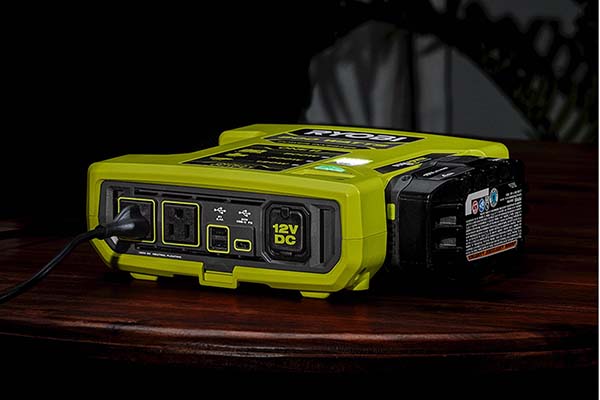
Ryobi’s Entry into the Portable Power Market:
Ryobi’s decision to introduce a power inverter stems from their commitment to providing versatile tools for every scenario. Recognizing the increasing need for portable power solutions, whether for recreational activities or emergency backup, Ryobi’s inverter offering has catered to this demand.
Compatibility with Ryobi Batteries:
Ryobi power inverters are typically designed to work seamlessly with the Ryobi ONE+ battery system, ensuring that users who have invested in the Ryobi ecosystem can utilize their existing batteries.
Compact Design:
The design is geared towards portability, allowing users to easily transport the inverter to various locations, whether it’s for camping, work sites, or other outdoor activities.
Multiple Power Outlets:
Depending on the model, Ryobi inverters might offer multiple types of power outputs, including standard 120V AC outlets and USB ports. This ensures a wide variety of devices, from smartphones to certain household appliances, can be powered or charged.
Safety Features:
Safety is paramount when dealing with electrical devices. Ryobi inverters often come equipped with overload protection to prevent potential damage to both the inverter and the connected devices. Indicator lights provide a visual cue about the inverter’s operational status.
Continuous Power Supply:
Ryobi power inverters offer a continuous power output suitable for running various devices. For instance, some models can deliver a continuous 150 watts of power, making them ideal for charging or powering smaller devices.
Modified Sine Wave Output:
While pure sine wave inverters replicate the exact form of power you’d get from household outlets, many portable inverters, including some from Ryobi, use a modified sine wave. This is generally suitable for most devices, although some sensitive equipment might require pure sine wave power.
Quiet Operation:
Unlike generators which can be noisy, Ryobi power inverters operate silently, making them perfect for situations where noise could be a concern.
Durable Construction:
Built with the needs of the user in mind, Ryobi inverters are constructed to withstand regular wear and tear, ensuring longevity and reliability.
Features of the Ryobi Power Inverter:
- Compact Design: One of the most standout features is its compact and portable design, making it easy to carry around and store.
- Multiple Outlets: The inverter includes standard 120V AC outlets and USB ports, accommodating a variety of devices from laptops to smartphones.
- Compatibility: Ryobi’s power inverter is compatible with their 18V ONE+ batteries, ensuring seamless integration for those already invested in the Ryobi ecosystem.
- Safety Protections: Overload protection and indicator lights ensure that users are always aware of the operational status and any potential issues.
Potential Use-cases:
- Camping and Outdoor Activities: It’s an excellent tool for those who enjoy camping, providing power for lighting, charging devices, or even running small appliances.
- Emergency Situations: In the event of a power outage, having a reliable inverter can be crucial. It can power essential devices like radios, fans, and phones.
- Work Sites: For professionals working on sites without direct access to power, this inverter provides a practical solution.
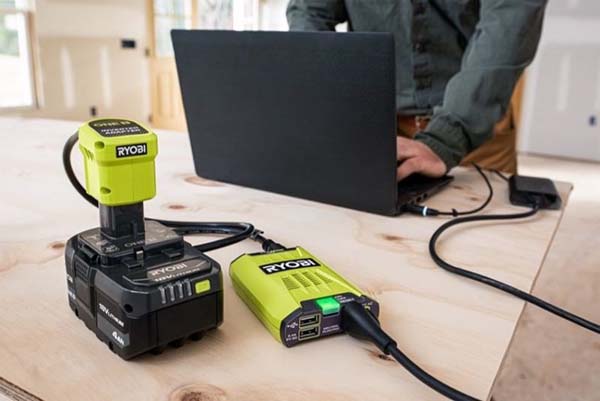
Benefits of Choosing Ryobi:
Ryobi is a well-known brand in the world of power tools, garden equipment, and other household products. Their presence has been recognized by both professional tradespeople and DIY enthusiasts. Here are some benefits of choosing Ryobi as your go-to brand:
1. Versatility:
- Ryobi’s 18V ONE+ system allows users to power over 100 different tools with a single battery platform. This intercompatibility ensures users can expand their toolkit without needing to invest in different battery systems.
2. Affordability:
- Compared to some other professional-grade brands, Ryobi tends to be more wallet-friendly. Their products strike a balance between quality and cost, making it accessible to both professionals and hobbyists.
3. Broad Product Range:
- From power tools like drills and saws to garden equipment like mowers and trimmers, Ryobi offers a comprehensive range of products that cater to a wide array of needs.
4. Innovation:
- Ryobi consistently brings new technologies and features to its products. Examples include brushless motors for longer tool life and better performance, as well as innovative designs like hybrid tools that can run on either battery or corded power.
5. Reliable Quality:
- Despite being positioned as a more budget-friendly option, Ryobi doesn’t compromise significantly on quality. Their products are known to be durable and reliable for their price point.
6. Easy Availability:
- Ryobi products are widely available at major retailers, making it easy for users to purchase tools or get replacement parts when needed.
7. Environmentally Friendly Options:
- Ryobi offers a range of cordless electric yard tools, which serve as eco-friendly alternatives to gas-powered tools. These reduce carbon emissions and are generally easier to maintain.
8. User-Friendly Designs:
- Many of Ryobi’s tools are designed with the DIYer in mind. This means they often incorporate features that make the tools more intuitive and easier to use for those who might not be professionals.
9. Community and Support:
- Ryobi has a strong online presence and community. They offer support through their website and social media channels, and users often share their projects and experiences, fostering a sense of community among Ryobi enthusiasts.
10. Warranty and Service:
Ryobi products usually come with a decent warranty period, indicating the company’s trust in its products’ durability. They also have a broad network of service centers to assist with repairs and replacements.
Top 3 ryobi power inverter
he company’s venture into power inverters is a part of its commitment to provide solutions for a variety of user needs. Here are some top Ryobi power inverters:
Ryobi 18V ONE+ Power Inverter (150 Watt):
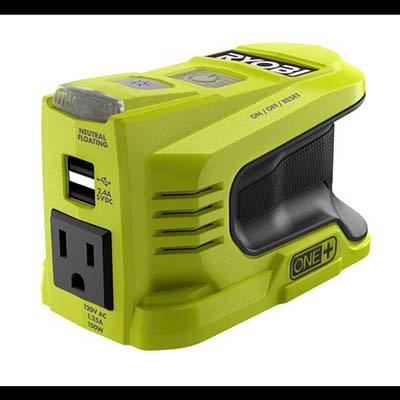
Features:
-
- Converts 18V battery power to 120V AC power.
- Includes a USB port and one 120V AC outlet.
- Compact design for portability.
- Overload protection ensures longevity.
Usage: This is perfect for charging smaller devices such as smartphones, laptops, and tablets. Its compact design makes it great for on-the-go needs.
Ryobi 40V Power Source 300 Watt Battery Inverter:
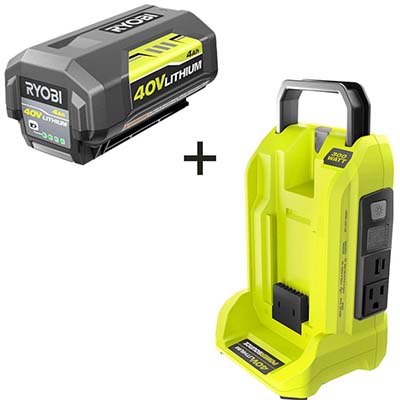
Features:
-
- Uses the more powerful 40V Ryobi battery.
- Offers 300 watts of continuous output.
- Comes with two USB ports and one 120V AC outlet.
- Push-button start for ease of use.
- Equipped with a modified sine wave which is suitable for many appliances.
Usage: Given its higher power output, this inverter can be used for heavier applications like powering small household appliances or tools in short bursts.
Ryobi 18V ONE+ Powersource 150 Watt Battery Inverter with Modified Sine Wave:
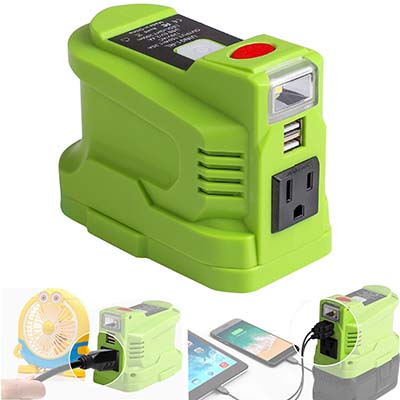
Features:
-
- Similar to the standard 150 Watt 18V ONE+, but with a modified sine wave.
- Suitable for a broader range of devices.
- Comes with a USB port and one 120V AC outlet.
Usage: It provides a more stable power source for devices that may be sensitive to power fluctuations.
Considerations when choosing a Ryobi power inverter:
- Power Needs: Determine the wattage requirement of the devices you plan to power. Always choose an inverter that offers more wattage than your total combined need to prevent overload.
- Battery Compatibility: Ensure you have the compatible Ryobi battery for the inverter model you choose. For instance, an 18V inverter will need an 18V Ryobi battery.
- Sine Wave: Pure sine wave inverters provide power closest to what’s available from the grid, making them suitable for sensitive electronics. Modified sine wave inverters can power most household appliances but may not be as efficient or suitable for more sensitive devices.
- Portability and Size: If you’re planning to use the inverter on-the-go, consider its size and weight.
Customer Feedback and Reviews:
Overall, the Ryobi power inverter has received positive feedback from users. Many appreciate its portability, ease of use, and the flexibility it offers in various scenarios. However, as with any product, there are occasional criticisms, often related to its power limitations or compatibility with non-Ryobi batteries.
Positive Feedback:
- Value for Money: Many customers feel that Ryobi offers great value, providing tools that are affordable without compromising too much on quality.
- Battery System: The ONE+ system is often praised for its versatility, allowing users to switch between various tools without needing multiple battery types.
- Innovative Features: Users appreciate some of Ryobi’s unique features, such as hybrid power options that work both corded and cordless.
- Durability: Several reviews mention that their Ryobi tools have lasted for years without significant issues, which speaks volumes about the product’s build quality.
- Availability of Products: Many customers appreciate the easy availability of Ryobi products at major retailers.
Negative Feedback:
- Professional Usage: Some professionals find that while Ryobi is excellent for light to medium-duty tasks, it might not always meet the demands of heavy-duty, continuous professional use.
- Battery Lifespan: While the ONE+ system is versatile, some users have noted that the batteries might not hold their charge as well over time, especially when compared to some higher-end brands.
- Service and Support: A few users have mentioned issues related to service, whether it’s getting replacements or repairs. However, this seems to be more of a regional issue, depending on the service centers available in a particular area.
- Weight: Some users find certain Ryobi tools, especially the battery-operated ones, a bit on the heavier side.
Neutral/Common Feedback:
- Comparisons with High-End Brands: Many users draw comparisons between Ryobi and more professional or high-end brands. The general consensus is that while Ryobi might not match the top-tier brands in every aspect, it offers a balanced performance for its price.
- Product Range: Some users wish for a broader product range in specific categories, especially when comparing the brand to its competitors.
Conclusion:
The Ryobi power inverter stands as a testament to the brand’s dedication to providing practical, user-friendly solutions. Whether you’re a professional in need of portable power on a work site, an outdoor enthusiast, or simply someone preparing for potential power outages, this inverter could be a valuable addition to your tool collection. As always, understanding your specific power needs and how this tool integrates into your current setup will be crucial in making an informed decision.
Deliventura’s review



